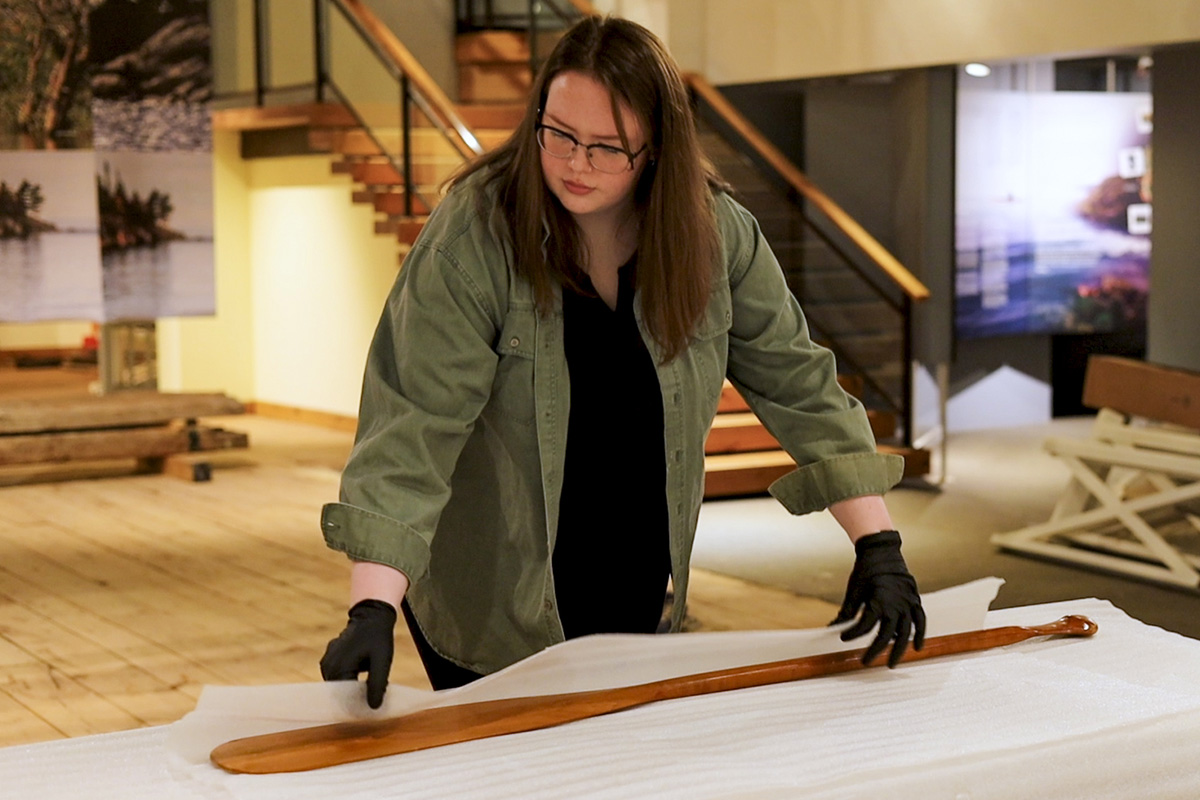Donate an Artifact
At The Canadian Canoe Museum, we steward the world’s largest collection of paddled watercraft, which was built in part with help from artifact donors like you!
As a private, not-for-profit organization, The Canadian Canoe Museum relies on donated artifacts to enrich its collection, which is both national and international in scope.
In keeping with our mission and core values, the Museum collects objects and archival materials associated with the cultural and technical heritage of the canoe, kayak and paddled watercraft.
When you donate an artifact to The Canadian Canoe Museum, you play a vital role in helping us share new and diverse stories.
How to Donate an Artifact

Thank you for considering making an artifact donation to The Canadian Canoe Museum. The first step in offering an object to the Museum is to email our curatorial team.
Do not bring your object to the Museum without first contacting a staff member. We cannot assess objects onsite, and objects cannot be dropped off at the Museum.
Our curatorial team will guide you through the process. Please include recent photos of your object.
You will then receive a questionnaire to provide us with as much information as possible about your object.
- The object’s story or provenance (not just who owned or made it, but any stories and associations of interest).
- The condition of the object.
- Any known restoration or repair efforts or modifications.
- Manufacturer’s marks or builder’s/maker’s signatures.
- The dimensions of the object.
- Photographs of the object in its current condition.
- Any additional associated photos, video footage, publications or documents that could enhance the story of this object.
Frequently Asked Questions
Our curatorial team will compare your object with items already in the Museum’s collection and research its relevance to the collection. One of two outcomes will occur:
- Curatorial staff may determine that your object is unsuitable for the collection (due to duplication, poor condition, lack of provenance, etc.), and we may recommend another museum or archive whose collecting mandate more closely relates to your object(s).
- Curatorial staff will present your object(s) to the Museum’s Collections Committee for further assessment.
The Museum’s Collections Committee meets quarterly to review and decide on all potential acquisitions. They determine if an object is suitable for the permanent collection based on criteria outlined in the Museum’s Collections Management Policy. They assess each object on the basis of:
- Relevance: the object(s) must support the Museum’s mission and objectives and fit within its collecting criteria.
- Physical Condition: the object(s) must be in an appropriate condition and a reasonable state of completeness.
- Use: the object(s) must have the capacity for use in exhibitions, research, public programming and/or education.
- Documentation: the object(s) must have no unreasonable restrictions or encumbrances constraining the Museum’s right to exercise full stewardship, care, use, management or disposition of the material. The donor must have free and clear title of the object(s).
- Authenticity: the object(s) must have a demonstrated authenticity and established provenance.
- Rarity: the object(s) must be unique or relatively rare, a good example of its type or not well-represented in the collection.
- Safety: the object(s) must pose no hazard to the facility, other objects, staff, visitors or volunteers.
- Duplication: the object(s) cannot be a duplicate of something in the Museum’s collection unless the object offered is in better condition or is a better representation.
The Museum’s Collections Committee meets quarterly. Depending on when your information is received, it may take several months to decide on your potential donation.
The Museum receives numerous offers of donations to its permanent collection each year and is unable to accept all offers. If we cannot accept your object, our staff may suggest other museums or archives whose collecting mandate aligns more closely with your object. If the Museum declines a donation and the donor decides to sell the object(s), Museum staff cannot provide evaluations or financial advice.
Our curatorial team will contact you by phone or email to inform you that your object(s) have been accepted into the permanent collection and to discuss transportation arrangements.
Our curatorial team will coordinate a suitable time for you to bring the object to the Museum. If needed, staff may be able to arrange a pick up of the object.
When you accept an offer, the Museum will ask you to sign a Gift Agreement to transfer ownership of the object(s) to The Canadian Canoe Museum.
No, once you have donated an object, the object(s) becomes the legal property of the Museum and cannot be returned. As such, you may wish to discuss the donation with your family before contacting the Museum.
As a registered charity, The Canadian Canoe Museum can issue gift-in-kind income tax receipts for the fair market value of a donated object in accordance with our procedures and Canada Revenue Agency regulations.
As part of this process, an independent appraiser must assess any object with an anticipated value exceeding $1000. The donor is responsible for covering these associated costs. Please note that the appraisal service is not a tax receiptable item.
Lastly, your tax receipt will only be provided for the year the object physically arrives at the Museum. (For example, if your donation is approved in November 2023 but received by the Museum in March 2024, you will receive your tax receipt by December 2024 at the latest.)
For income tax purposes, fair market value is the amount that something would sell for in an open market between a willing buyer and a willing seller, who are knowledgeable, informed, prudent and who are acting independently of each other.
Depending on the nature of the object(s) and the availability of appraisers with the required expertise, determining the fair market value may take several months or longer. Income tax legislation prohibits you from including taxes or customs duties as part of the value.
We recommend that you consult your financial advisor or Revenue Canada to learn more about the tax implications of a donation or sale.
Our curatorial staff will receive and process your donated object(s). Once processed, staff will create a catalogue record for the object(s), allowing easy access to information about the artifact and reducing the need for physical handling.
If the artifact is fragile, staff may create supports to ensure proper preservation, care, and storage.
The Canadian Canoe Museum will then safely store the object(s) onsite in the Collection Hall, Small Artifact Room, or Library and Archives or display the object(s) in the Exhibition Hall.
Once a donor donates an object to The Canadian Canoe Museum, it becomes the property of the Museum. The Museum may store, display, or interpret the object in accordance with established museum practices.
We are privileged to acknowledge donors and their invaluable support each year by featuring their names in our Annual Reports.
Donors also have the option to remain anonymous.
The public may access objects in the collection through the Museum’s collections database by making a request to curatorial staff.
The Canadian Canoe Museum will also consider objects when planning temporary, travelling or permanent exhibits, and the Museum may loan objects to other public institutions for special exhibitions.
The Canadian Canoe Museum has a vast collection of artifacts. With more than 600 canoes and kayaks, hundreds of small artifacts, and thousands of books, it is not feasible to display it in its entirety. However, visitors can view the expanse of the watercraft collection from the windows in the Atrium and Mezzanine or go behind the scenes in the Collection Hall on a tour.
The Museum acquires artifacts for many reasons, such as their rarity and historical significance, for research purposes, and for use in future exhibitions. We cannot guarantee that any object or artifact will be on display or for how long they will be on exhibit.
Museums periodically assess their collections and may decide to remove (deaccession) artifacts. Learn about our deaccessioning process.
United States Residents
If you are a potential donor residing in the United States, you may be eligible for a tax receipt issued for donations made to Canadian institutions.
The IRS Publication 526: Charitable Contributions is a good resource for determining if you can benefit from a donation and tax receipt. This publication states that you may be able to deduct contributions to certain Canadian charitable organizations covered under an income tax treaty with Canada.
To deduct your contribution to a Canadian charity, you generally must have income from sources in Canada.
You can find more information on how to calculate your deduction in the IRS Publication 597: Information on the United States-Canada Income Tax Treaty.
Thank you for considering The Canadian Canoe Museum as a new home for your cherished artifact. Together, we continue to paddle forward in honouring and preserving this remarkable legacy!






